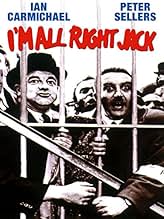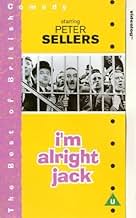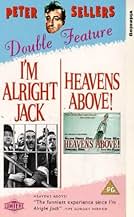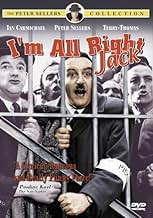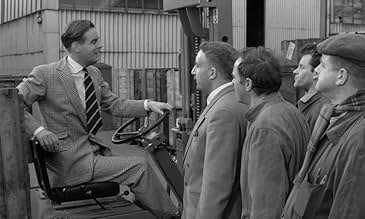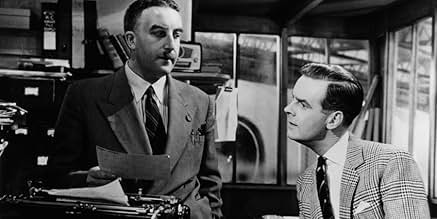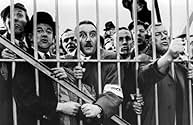IMDb RATING
7.1/10
4.7K
YOUR RATING
A naive, dimwitted young man of aristocratic background in search of a career becomes caught up in the struggles between his profit-minded uncle and an aggressive labor union.A naive, dimwitted young man of aristocratic background in search of a career becomes caught up in the struggles between his profit-minded uncle and an aggressive labor union.A naive, dimwitted young man of aristocratic background in search of a career becomes caught up in the struggles between his profit-minded uncle and an aggressive labor union.
- Won 2 BAFTA Awards
- 3 wins & 1 nomination total
Dennis Price
- Bertram Tracepurcel
- (as Denis Price)
Featured reviews
After the second world war is over, a new spirit of togetherness is fostered in the UK, and industry blossoms. Eager to get involved, the well-to-do Stanley Windrush tries to get a management job but fails. However some friends of the family, head of industry types get him a job with the workers at a missile factory. However his enthusiasm gets him in trouble with the all-powerful unions but is that what the bosses planned for all along?
First of all I cannot believe that this film has so few votes and comments (at time of writing this it's 270 and 5 respectively). I know this doesn't correlate with the number of users who have seen the film but it is a fair representation! I find that shocking, as this is one of the stronger satires I've seen for a good long while. The plot is a sort of comedy ploy by the bosses to shift work around to other firms (by relying on their own firm striking) and get personally rich as a result, however it is the satirical edge that makes it worth watching. Both bosses and unions get it in the neck here neither coming off well in the wash!
Bosses are seen as profit driven and not looking at the greater good, workers on the other hand are seen as looking after themselves while the unions cause more problems than they solve! There is an element of truth in all this that's why it is funny although it is obviously laid on a bit strong in the name of comedy. As a current worker in the UK manufacturing industry (yes, there is some left although it's an American company!) I am greatly amused by the caricatures as some elements (happily less each year) of them can still be seen in my place of employment! The management get off quite light as they are actually, at core, trying to improve the business's efficiency and thus compete with foreign firms. The workers and the unions get the hardest stick which is a little unfair after all the workers make the least and are the ones at risk, while the unions have brought about great steps in workers rights. For example it was funny for me to see FLT's moving around in heavily pedestrianised areas nowadays many larger factories will be totally segregated between vehicles and workers.
The plot does manage to mix the swipes so that it seems fair on the surface it is a pretty damning dig at British industry and, from modern views, it is quite prophetic as British industry has really fallen in the past few decades. The `one out, all out' strike mentality is well spoofed here but there's no doubting the damage that it (with other factors) has had. The only downside of the film looking back, is the racist views and racist language that is used at a couple of moments but in fairness these are not THAT offensive and can be overlooked as the culture of the film at the time.
Despite the quite anti-union feel to the film, Sellers does well to not overplay his character. The socialist worker type is really easy to get laughs off but Sellers brings out character and doesn't just go for an out and out mockery of the character. Carmichael is OK in the lead but is overshadowed by the sheer depth of excellent support roles. Le Mesurier's excellent, twitchy efficiency expert, Thomas' manager sweating and terrified of the workers he calls `an absolute shower' in the way only he can say it! Further faces fall into the film in the distinguished shapes of Attenborough, Rutherford and Price to name a few.
Overall this film comes out as a very classy satire. It hits the nail on the head and, over 40 years later, much of it can still be seen today and the damage from the stuff it satirises is being felt. The film is funny if you have a passing understanding of British industry in terms of politics, workers rights and unions even without this understanding the central plot is broad enough and funny enough to be worth seeing!
First of all I cannot believe that this film has so few votes and comments (at time of writing this it's 270 and 5 respectively). I know this doesn't correlate with the number of users who have seen the film but it is a fair representation! I find that shocking, as this is one of the stronger satires I've seen for a good long while. The plot is a sort of comedy ploy by the bosses to shift work around to other firms (by relying on their own firm striking) and get personally rich as a result, however it is the satirical edge that makes it worth watching. Both bosses and unions get it in the neck here neither coming off well in the wash!
Bosses are seen as profit driven and not looking at the greater good, workers on the other hand are seen as looking after themselves while the unions cause more problems than they solve! There is an element of truth in all this that's why it is funny although it is obviously laid on a bit strong in the name of comedy. As a current worker in the UK manufacturing industry (yes, there is some left although it's an American company!) I am greatly amused by the caricatures as some elements (happily less each year) of them can still be seen in my place of employment! The management get off quite light as they are actually, at core, trying to improve the business's efficiency and thus compete with foreign firms. The workers and the unions get the hardest stick which is a little unfair after all the workers make the least and are the ones at risk, while the unions have brought about great steps in workers rights. For example it was funny for me to see FLT's moving around in heavily pedestrianised areas nowadays many larger factories will be totally segregated between vehicles and workers.
The plot does manage to mix the swipes so that it seems fair on the surface it is a pretty damning dig at British industry and, from modern views, it is quite prophetic as British industry has really fallen in the past few decades. The `one out, all out' strike mentality is well spoofed here but there's no doubting the damage that it (with other factors) has had. The only downside of the film looking back, is the racist views and racist language that is used at a couple of moments but in fairness these are not THAT offensive and can be overlooked as the culture of the film at the time.
Despite the quite anti-union feel to the film, Sellers does well to not overplay his character. The socialist worker type is really easy to get laughs off but Sellers brings out character and doesn't just go for an out and out mockery of the character. Carmichael is OK in the lead but is overshadowed by the sheer depth of excellent support roles. Le Mesurier's excellent, twitchy efficiency expert, Thomas' manager sweating and terrified of the workers he calls `an absolute shower' in the way only he can say it! Further faces fall into the film in the distinguished shapes of Attenborough, Rutherford and Price to name a few.
Overall this film comes out as a very classy satire. It hits the nail on the head and, over 40 years later, much of it can still be seen today and the damage from the stuff it satirises is being felt. The film is funny if you have a passing understanding of British industry in terms of politics, workers rights and unions even without this understanding the central plot is broad enough and funny enough to be worth seeing!
10miloc
Along with Alexander Mackendrick's "The Man in the White Suit," this is THE great satire of management-labor relations: less allegorical and more cheerfully crass. In a way this movie seems like a sort of crossroads in British comedy, poised between the warmer eccentricities of the Ealing films and and the screw-'em-all pop irreverence of the rising New Wave.
These days the film seems to be primarily remembered for Peter Sellers' magnificent caricature of socialist sanctimony, Fred Kite, but the whole gallery of players, many reprising roles from the earlier "Private's Progress," is excellent. Carmichael, all inane, wild-eyed grins, is Woosterish as ever as the brainless but well-intentioned Windrush. Terry-Thomas produces a very funny sketch of middle-class middle management. It's a perfect picture of lazy hypocrisy: the man who settles into a do-nothing job, knowing exactly how awful it is but not caring so long as he gets through the day. He had a face made for contempt; watching his mustache curl as he reads an entry in the workers' suggestion box ("Filthy beast," he mutters, as he tucks it away in a pocket) or as he picks his way through the rubbish of Kite's wifeless home is a joy. Price and Attenborough are, as always, first-class rotters, the iciest of the moneyed class, and Handl, Le Mesurier and Rutherford add vividly funny moments. As the war over Windrush expands from workplace to societal to domestic spheres, watching the various characters bounce and interact provides some of the movie's best-observed moments, such as the brief tea scene between Rutherford and Handl, who, though inhabiting utterly different worlds, seem to interact perfectly in mutual obliviousness.
And there is Sellers, of course, pitch-perfect whether marching around the factory like the lead float in a parade or rhapsodizing about Russia or going hilariously blank on live television. It's memorable work that might overbalance the movie's double-edged attack if it weren't human enough to be sympathetic as well.
All in all, silly, clever, raucous fun.
These days the film seems to be primarily remembered for Peter Sellers' magnificent caricature of socialist sanctimony, Fred Kite, but the whole gallery of players, many reprising roles from the earlier "Private's Progress," is excellent. Carmichael, all inane, wild-eyed grins, is Woosterish as ever as the brainless but well-intentioned Windrush. Terry-Thomas produces a very funny sketch of middle-class middle management. It's a perfect picture of lazy hypocrisy: the man who settles into a do-nothing job, knowing exactly how awful it is but not caring so long as he gets through the day. He had a face made for contempt; watching his mustache curl as he reads an entry in the workers' suggestion box ("Filthy beast," he mutters, as he tucks it away in a pocket) or as he picks his way through the rubbish of Kite's wifeless home is a joy. Price and Attenborough are, as always, first-class rotters, the iciest of the moneyed class, and Handl, Le Mesurier and Rutherford add vividly funny moments. As the war over Windrush expands from workplace to societal to domestic spheres, watching the various characters bounce and interact provides some of the movie's best-observed moments, such as the brief tea scene between Rutherford and Handl, who, though inhabiting utterly different worlds, seem to interact perfectly in mutual obliviousness.
And there is Sellers, of course, pitch-perfect whether marching around the factory like the lead float in a parade or rhapsodizing about Russia or going hilariously blank on live television. It's memorable work that might overbalance the movie's double-edged attack if it weren't human enough to be sympathetic as well.
All in all, silly, clever, raucous fun.
10mzinkin
For me, this is the best film of all time. A superb cast of the UK's finest character actors and an A1 script.
Peter Sellers was truly magnificent as the left wing union shop steward and Terry Thomas excelled in playing the two faced Personnel Manager. Among his classic comments are "The Management have behaved like absolute stinkers" when talking to the union and " They are a complete shower" when talking to Management about the unions. Another fine comment is when on being told that some bigwigs are visiting the factory, Terry Thomas replies "You better spruce the place up a bit, you know soap in the toilets, that sort of thing".
I must have seen this film at least 20 times and I never grow tired of it. Great story, fine comedy and great acting. Never has a film handled the issue of industrial relations in such an amusing and pertinent manner.
Peter Sellers was truly magnificent as the left wing union shop steward and Terry Thomas excelled in playing the two faced Personnel Manager. Among his classic comments are "The Management have behaved like absolute stinkers" when talking to the union and " They are a complete shower" when talking to Management about the unions. Another fine comment is when on being told that some bigwigs are visiting the factory, Terry Thomas replies "You better spruce the place up a bit, you know soap in the toilets, that sort of thing".
I must have seen this film at least 20 times and I never grow tired of it. Great story, fine comedy and great acting. Never has a film handled the issue of industrial relations in such an amusing and pertinent manner.
Ah, progress. Never mind that tosh. "I'm All Right Jack" is a hilarious send up of the 20th century very much on point today, an anything-goes capitalist-meets-socialist system where workers and owners are equally victimized.
Peter Sellers won the British Academy Award for Best British Actor for his performance as union leader Fred Kite, beating out a field that year which included Laurence Olivier, Laurence Harvey, Richard Burton, and Peter Finch. Ian Carmichael is the actual lead actor in "I'm All Right Jack", and Kite doesn't even show up until after the first 20 minutes, but Sellers makes Kite a compelling and comedic character worth remembering as a symbol of organized labor run amuk.
A kind of sequel to "Private's Progress", also featuring Carmichael in the role of Stanley Windrush, "I'm All Right Jack" is a swinging social satire. Two factory owners (played by Dennis Price and Richard Attenborough) conspire to create a labor strike at a munitions factory to get a higher price. To do that, they need someone to create a bit of friction. Enter Windrush, a total innocent upper-class twit who only cares about earning his pay, no matter how much that offends Kite and other labor leaders.
"We're living in the welfare state," says the middle manager Hitchcock (Terry-Thomas). "I call it the farewell state."
"I'm All Right Jack" starts out very cheeky indeed, with a surprising eyeful of female nudity circa 1959 and cracks at religion and the military. Later, a stuttering character sees an array of photographers and asks: "Why don't you tell them to f-f-f-photograph something worthwhile."
The only major problem with "I'm All Right Jack" is the slowness of the film right up until Windrush arrives at Missiles Ltd., after which the comedy becomes a kind of classless class comedy, where shrapnel flies thick and fast and no one is immune. Sellers' performance is brilliant, giving you a character who's likable even as he plays the antagonist. You can scorn his love of Stalinist Russia, which he boils down to cornfields and ballet, but you empathize with his fairness (not wanting to fire Windrush is his undoubted downfall) and his sensitivity for the feelings of Mrs. Kite (Irene Handl) and their daughter (Liz Fraser). He's just a bit extreme.
"We cannot and do not accept the principle that incompetence justifies dismissal," Kite argues. "That is victimization."
The real bad guys are the bosses guying the system, though John Boulting, who directed and co-wrote this with Alan Hackney and Frank Harvey, wants you to see the union abuses that make such a scam not only possible but desirable to the upper classes.
Sellers also appears at the film's outset as "Sir John", a men's-club inhabitant who witnesses the end of World War II as an unpleasant upending of the old social order, before disappearing in the postwar wake. "A solid block in what seemed the edifice of an ordered and stable society," is his postscript.
Contrast him with the very hip, 60s-sounding Al Saxon theme song that sticks its post-war, pre-Beatles attitude in your face as smartly as flipping the bird to Churchill (something else we get to see in the first few minutes), and you find yourself watching what had to be for 1959 a very mod film. It still stands up today as one of the best labor-management comedies, even if the British class system it addresses is no more.
Peter Sellers won the British Academy Award for Best British Actor for his performance as union leader Fred Kite, beating out a field that year which included Laurence Olivier, Laurence Harvey, Richard Burton, and Peter Finch. Ian Carmichael is the actual lead actor in "I'm All Right Jack", and Kite doesn't even show up until after the first 20 minutes, but Sellers makes Kite a compelling and comedic character worth remembering as a symbol of organized labor run amuk.
A kind of sequel to "Private's Progress", also featuring Carmichael in the role of Stanley Windrush, "I'm All Right Jack" is a swinging social satire. Two factory owners (played by Dennis Price and Richard Attenborough) conspire to create a labor strike at a munitions factory to get a higher price. To do that, they need someone to create a bit of friction. Enter Windrush, a total innocent upper-class twit who only cares about earning his pay, no matter how much that offends Kite and other labor leaders.
"We're living in the welfare state," says the middle manager Hitchcock (Terry-Thomas). "I call it the farewell state."
"I'm All Right Jack" starts out very cheeky indeed, with a surprising eyeful of female nudity circa 1959 and cracks at religion and the military. Later, a stuttering character sees an array of photographers and asks: "Why don't you tell them to f-f-f-photograph something worthwhile."
The only major problem with "I'm All Right Jack" is the slowness of the film right up until Windrush arrives at Missiles Ltd., after which the comedy becomes a kind of classless class comedy, where shrapnel flies thick and fast and no one is immune. Sellers' performance is brilliant, giving you a character who's likable even as he plays the antagonist. You can scorn his love of Stalinist Russia, which he boils down to cornfields and ballet, but you empathize with his fairness (not wanting to fire Windrush is his undoubted downfall) and his sensitivity for the feelings of Mrs. Kite (Irene Handl) and their daughter (Liz Fraser). He's just a bit extreme.
"We cannot and do not accept the principle that incompetence justifies dismissal," Kite argues. "That is victimization."
The real bad guys are the bosses guying the system, though John Boulting, who directed and co-wrote this with Alan Hackney and Frank Harvey, wants you to see the union abuses that make such a scam not only possible but desirable to the upper classes.
Sellers also appears at the film's outset as "Sir John", a men's-club inhabitant who witnesses the end of World War II as an unpleasant upending of the old social order, before disappearing in the postwar wake. "A solid block in what seemed the edifice of an ordered and stable society," is his postscript.
Contrast him with the very hip, 60s-sounding Al Saxon theme song that sticks its post-war, pre-Beatles attitude in your face as smartly as flipping the bird to Churchill (something else we get to see in the first few minutes), and you find yourself watching what had to be for 1959 a very mod film. It still stands up today as one of the best labor-management comedies, even if the British class system it addresses is no more.
I was quite surprised with this film, not because of liking it (I did), but just how much union politics the Boulting Brothers put on their sleeve with working on this movie. I have been in a Union business that failed before, and I was quite shocked at how much I could compare my own experiences with what was on display here with the Unions and Management trying to maneuver themselves ahead of on another. While Peter Sellers does put on a great performance, this really is Ian Carmichael's movie. I hadn't seen any of his work, and this was a great introduction. All of the other cast is great as well. One final note, it probably contains the most annoyingly catchy title song ever, it'll probably haunt your cranium for days.
Did you know
- TriviaThe machines in the Num Yum factory are a spoof on the Moloch scenes from Fritz Lang's film Metropolis.
- GoofsWhile Stanley Windrush demonstrates his forklift driving skills for Mr. Waters, he says "Well, I'm shifting these generators from the stores to here, for loading up." He drives over a bump and the (presumed full) boxes bounce as though they were empty.
- Crazy creditsOpening quote: "Oh! Brave New World that hath such people in't" --William Shakespeare
- ConnectionsEdited into Heroes of Comedy: Terry-Thomas (1995)
- How long is I'm All Right Jack?Powered by Alexa
Details
- Release date
- Country of origin
- Language
- Also known as
- Junger Mann aus gutem Hause
- Filming locations
- Flexello Factory, 268 Bath Road, Slough, UK(Stanley Windrush walks up to the factory entrance)
- Production companies
- See more company credits at IMDbPro
- Runtime
- 1h 45m(105 min)
- Color
- Aspect ratio
- 1.66 : 1
Contribute to this page
Suggest an edit or add missing content



